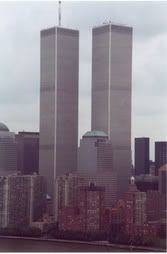Tuesday, December 27, 2005
Elevator Diffusion
Have you ever noticed how when you get into a crowded elevator there is some kind of metaphysical force that causes an automatic reshuffling of the occupants so that each person maximizes their individual space? Its particularly noticeable as the elevator rises and people exit on their respective floors. Once a person leaves, every person remaining on the elevator will shift their position, to allow for more space between everybody. And if someone doesn't move as expected, you can almost palpate the discomfort that everyone else feels at the ensuing dysequilibrium in personal space. This is regardless of whether or not someone has passed gas or not.
Why is that?
I remember there used to be a show or skit (on HBO?) in the Eighties called Sniglets that came up with words for things that weren't necessarily found in the dictionary. I seem to remember there being a word for this "elevator diffusion," but I can't remember what it is.
Comments:
<< Home
I'm very curious if this elevator behavior is universal or cultural.
I seem to remember (and this might be totally false) that "personal space" is a very cultural phenomenon. For example, as people walk into a movie theater they will initially pick seats far from other occupied seats so as to leave empty seats between them and others. They only sit adjacent to others as the theater fills up. What I remember (which may be untrue) was that in other (Eastern? Arab? no clue) cultures this avoidance would be considered impolite and that a stranger would sit close to an occupied seat even if the theater was relatively empty.
Can anyone confirm this?
I'm also very curious if I'm going to keep browsing blogs or get back to the preop I have to dictate.
I seem to remember (and this might be totally false) that "personal space" is a very cultural phenomenon. For example, as people walk into a movie theater they will initially pick seats far from other occupied seats so as to leave empty seats between them and others. They only sit adjacent to others as the theater fills up. What I remember (which may be untrue) was that in other (Eastern? Arab? no clue) cultures this avoidance would be considered impolite and that a stranger would sit close to an occupied seat even if the theater was relatively empty.
Can anyone confirm this?
I'm also very curious if I'm going to keep browsing blogs or get back to the preop I have to dictate.
Sorry Wanderer, this is the only thing I could find re elevators:
ELECELLERATION (el a cel er ay' shun)n. The mistaken notion that the more you press an elevator button the faster it will arrive.
But haven't you wanted to do this?:
BAZOOKACIDALTENDENCIES (bah zew' kuh sy dal ten' den seez) n. The overwhelming desire of most individuals to reach out and pop the gigantic gum bubble billowing from someone's mouth.
ELECELLERATION (el a cel er ay' shun)n. The mistaken notion that the more you press an elevator button the faster it will arrive.
But haven't you wanted to do this?:
BAZOOKACIDALTENDENCIES (bah zew' kuh sy dal ten' den seez) n. The overwhelming desire of most individuals to reach out and pop the gigantic gum bubble billowing from someone's mouth.
Bean- I think I agree with you that it is at least partially cultural. I remember in Israel people have a different notion of space - like at the ATM machine. Instead of an orderly line with enough space to allow the user to privately conduct their business, in Israel everyone kinda just crowds around the user waiting their turn. I'm not familiar with the culture you describe where it would be impolite not to sit with another occupant in an empty theater. A visit to our local Middle Eastern markets will also remind us of the cultural differences of space...
Cruisin' - thanks for the effort. Though they're not what I was looking for I like both the words you found!
Post a Comment
Cruisin' - thanks for the effort. Though they're not what I was looking for I like both the words you found!
<< Home








